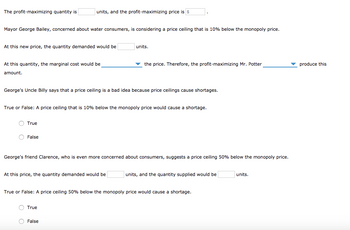
ENGR.ECONOMIC ANALYSIS
14th Edition
ISBN: 9780190931919
Author: NEWNAN
Publisher: Oxford University Press
expand_more
expand_more
format_list_bulleted
Question
Sub : Economics
Pls answer very fast.I ll upvote. Thank You

Transcribed Image Text:8. Problems and Applications Q8
Henry Potter owns the only well in town that produces clean drinking water. He faces the following demand, marginal revenue, and marginal cost
curves:
Demand:
P = 70-Q
Marginal Revenue: MR = 70-20
Marginal Cost:
MC = 10 + Q
On the following graph, use the blue line (circle symbol) to graph Mr. Potter's demand curve. Then, use the black line (cross symbol) to graph his
marginal revenue (MR) curve. Next, use the orange line (square symbol) to graph his marginal cost (MC) curve. Finally, use the grey point (star
symbol) to indicate the profit-maximizing price and quantity.
Price (Dollars)
80
70
60
50
40
30
20
10
0
-10
-20
-30
-40
-50
-60
-70
-80
0
10
20
30
40
Quantity (Units)
50
60
70
Demand
MR
0
MC
Profit-Maximization

Transcribed Image Text:The profit-maximizing quantity is
Mayor George Bailey, concerned about water consumers, is considering a price ceiling that is 10% below the monopoly price.
At this new price, the quantity demanded would be
At this quantity, the marginal cost would be
amount.
units, and the profit-maximizing price is $
O True
George's Uncle Billy says that a price ceiling is a bad idea because price ceilings cause shortages.
O False
True or False: A price ceiling that is 10% below the monopoly price would cause a shortage.
units.
At this price, the quantity demanded would be
the price. Therefore, the profit-maximizing Mr. Potter
George's friend Clarence, who is even more concerned about consumers, suggests a price ceiling 50% below the monopoly price.
True
False
True or False: A price ceiling 50% below the monopoly price would cause shortage.
units, and the quantity supplied would be
units.
produce this
Expert Solution
This question has been solved!
Explore an expertly crafted, step-by-step solution for a thorough understanding of key concepts.
Step by stepSolved in 3 steps with 1 images

Knowledge Booster
Learn more about
Need a deep-dive on the concept behind this application? Look no further. Learn more about this topic, economics and related others by exploring similar questions and additional content below.Similar questions
- I need answer typing clear urjent no chatgpt used i will give upvotesarrow_forwardExplain how does adecrease in the current income y affect the consumer’s consumption-saving decision. In particular,explain: 1) How will current consumption c, future consumption c′, and savings s change; 2) Arethere any substitution effect or income effect. Make sure you draw two figures, one for the borrowersand one for the lendersarrow_forwardQuestion 4 Explain how does a decrease in the current income y affect the consumer's consumption-saving decision. In particular, explain: 1) How will current consumption c, future consumption c', and savings s change; 2) Are there any substitution effect or income effect. Make sure you draw two figures, one for the borrowers and one for the lenders.arrow_forward
- Decrease/increasearrow_forwardt of curvenc ce of cure.. mce of curre ce of curre ence of c ck cyk ocurrency of currency... my risk recap to search KNOWLEDGE CHECK On June 23, 2016, the United Kingdom voted to leave the European Union. The white line shows the U.K.'s main equity index, the FTSE 100, from the start of 2016 to the date on which the U.K. government notified the European Union of its intent to leave. The orange line shows the number of dollars it takes to buy one pound sterling. The United Kingdom is a net importer, meaning the value of imports exceeds the value of exports. What can be reasonably surmised from the chart about large U.K. corporations? Click to open/close chart. They are probably heavy exporters. They are probably heavy importers. Their CEOs probably voted to leave the E.U. Their CEOs probably voted to remain in the E.U.arrow_forwardI need typing clear urjent no chatgpt use i will give 5 upvotesarrow_forward
arrow_back_ios
arrow_forward_ios
Recommended textbooks for you

 Principles of Economics (12th Edition)EconomicsISBN:9780134078779Author:Karl E. Case, Ray C. Fair, Sharon E. OsterPublisher:PEARSON
Principles of Economics (12th Edition)EconomicsISBN:9780134078779Author:Karl E. Case, Ray C. Fair, Sharon E. OsterPublisher:PEARSON Engineering Economy (17th Edition)EconomicsISBN:9780134870069Author:William G. Sullivan, Elin M. Wicks, C. Patrick KoellingPublisher:PEARSON
Engineering Economy (17th Edition)EconomicsISBN:9780134870069Author:William G. Sullivan, Elin M. Wicks, C. Patrick KoellingPublisher:PEARSON Principles of Economics (MindTap Course List)EconomicsISBN:9781305585126Author:N. Gregory MankiwPublisher:Cengage Learning
Principles of Economics (MindTap Course List)EconomicsISBN:9781305585126Author:N. Gregory MankiwPublisher:Cengage Learning Managerial Economics: A Problem Solving ApproachEconomicsISBN:9781337106665Author:Luke M. Froeb, Brian T. McCann, Michael R. Ward, Mike ShorPublisher:Cengage Learning
Managerial Economics: A Problem Solving ApproachEconomicsISBN:9781337106665Author:Luke M. Froeb, Brian T. McCann, Michael R. Ward, Mike ShorPublisher:Cengage Learning Managerial Economics & Business Strategy (Mcgraw-...EconomicsISBN:9781259290619Author:Michael Baye, Jeff PrincePublisher:McGraw-Hill Education
Managerial Economics & Business Strategy (Mcgraw-...EconomicsISBN:9781259290619Author:Michael Baye, Jeff PrincePublisher:McGraw-Hill Education


Principles of Economics (12th Edition)
Economics
ISBN:9780134078779
Author:Karl E. Case, Ray C. Fair, Sharon E. Oster
Publisher:PEARSON

Engineering Economy (17th Edition)
Economics
ISBN:9780134870069
Author:William G. Sullivan, Elin M. Wicks, C. Patrick Koelling
Publisher:PEARSON

Principles of Economics (MindTap Course List)
Economics
ISBN:9781305585126
Author:N. Gregory Mankiw
Publisher:Cengage Learning

Managerial Economics: A Problem Solving Approach
Economics
ISBN:9781337106665
Author:Luke M. Froeb, Brian T. McCann, Michael R. Ward, Mike Shor
Publisher:Cengage Learning

Managerial Economics & Business Strategy (Mcgraw-...
Economics
ISBN:9781259290619
Author:Michael Baye, Jeff Prince
Publisher:McGraw-Hill Education